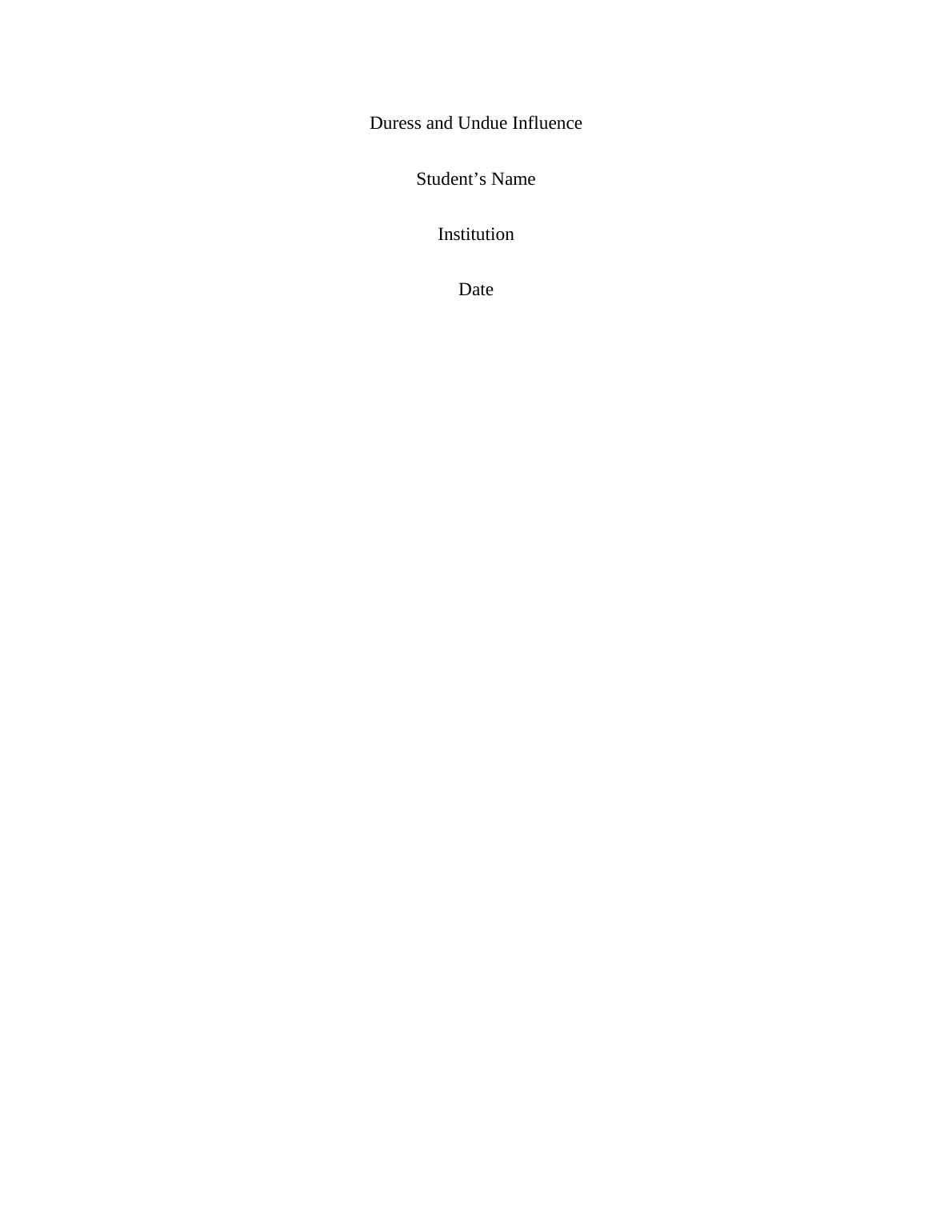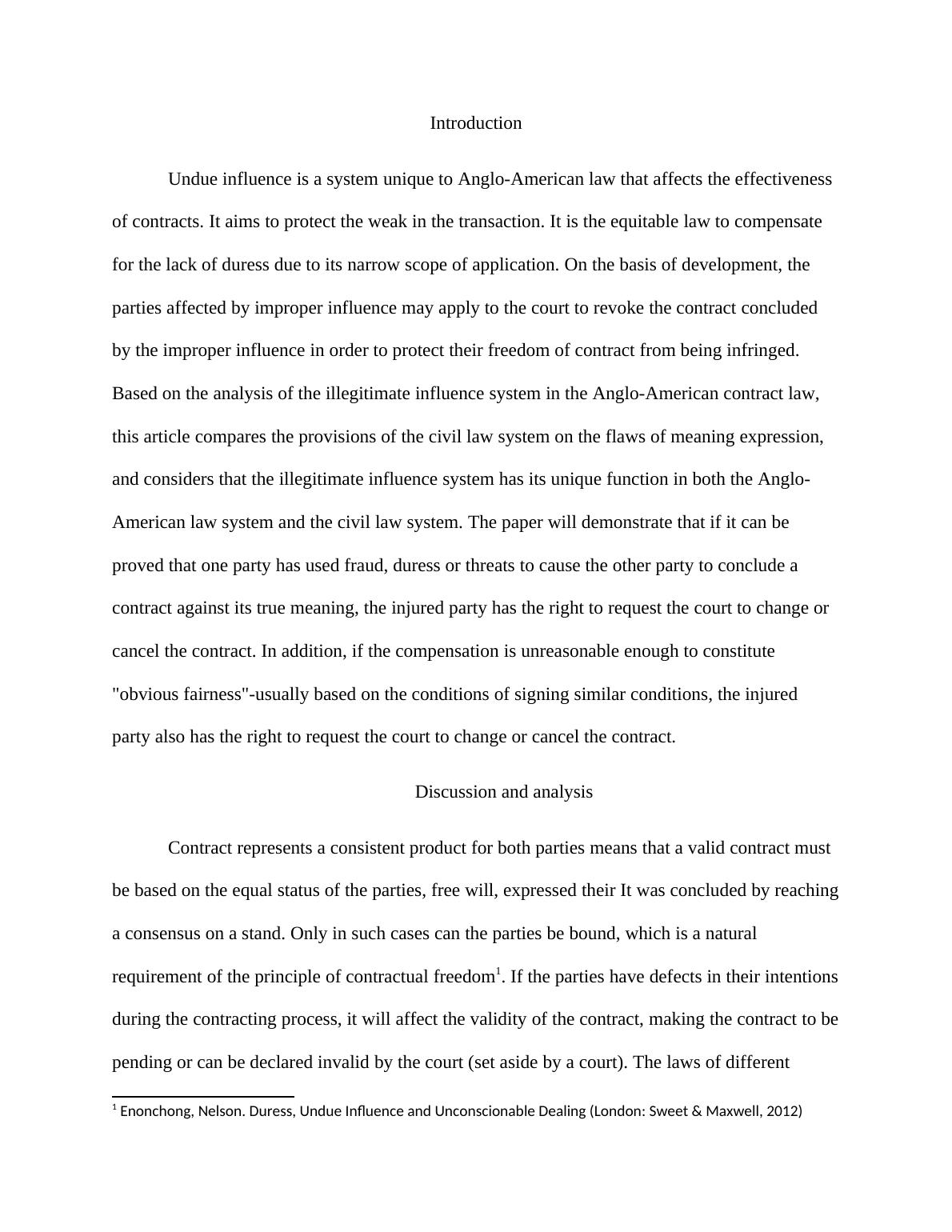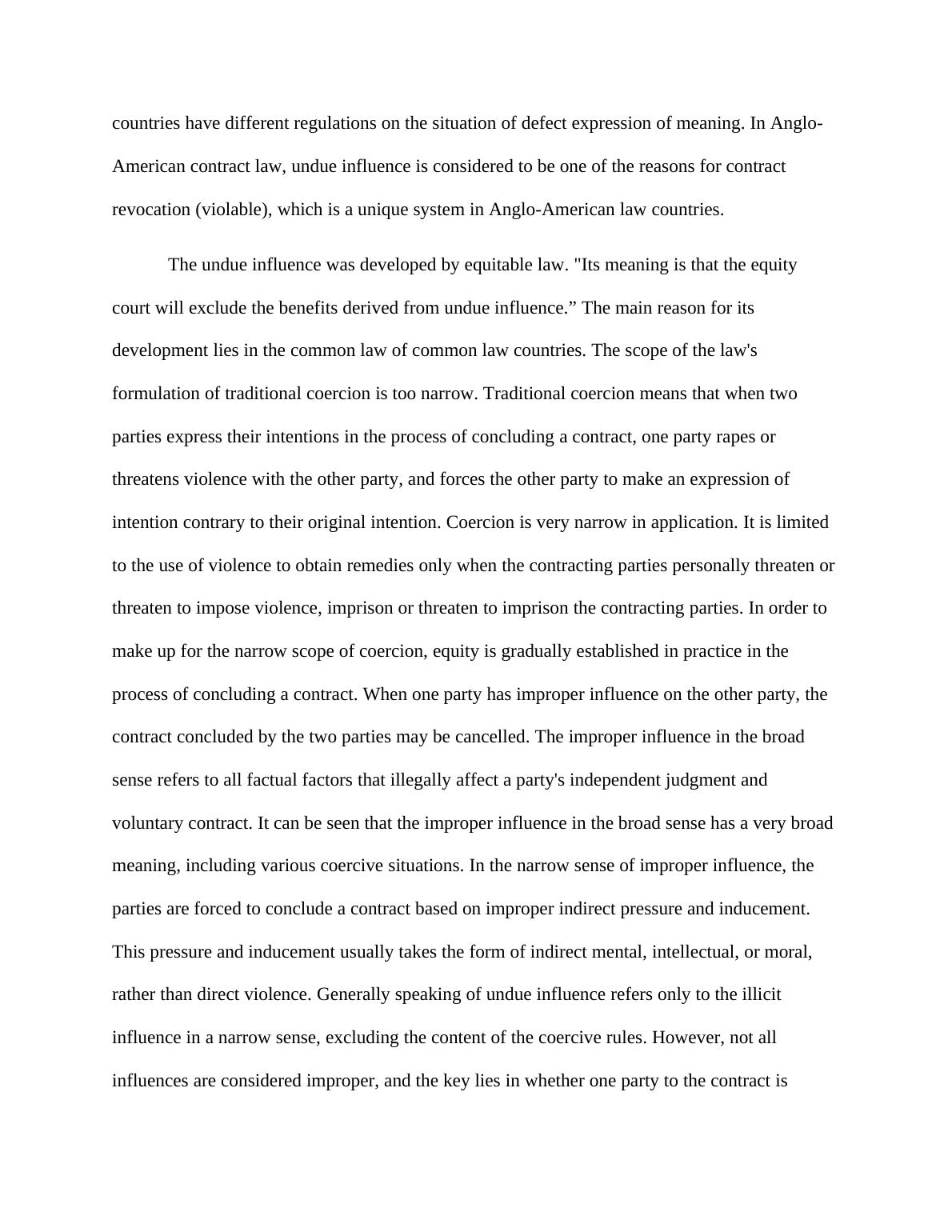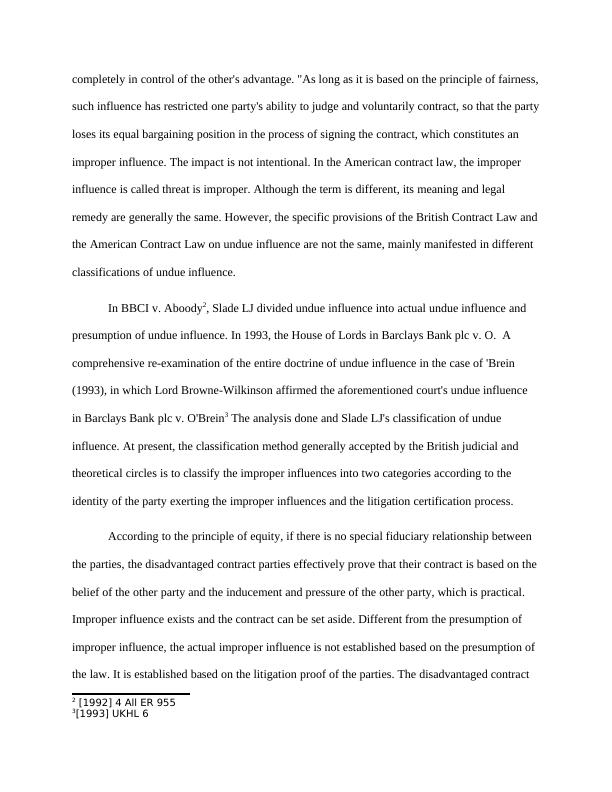Duress and Undue Influence
Added on 2022-09-08
12 Pages3468 Words22 Views
Duress and Undue Influence
Student’s Name
Institution
Date
Student’s Name
Institution
Date

Introduction
Undue influence is a system unique to Anglo-American law that affects the effectiveness
of contracts. It aims to protect the weak in the transaction. It is the equitable law to compensate
for the lack of duress due to its narrow scope of application. On the basis of development, the
parties affected by improper influence may apply to the court to revoke the contract concluded
by the improper influence in order to protect their freedom of contract from being infringed.
Based on the analysis of the illegitimate influence system in the Anglo-American contract law,
this article compares the provisions of the civil law system on the flaws of meaning expression,
and considers that the illegitimate influence system has its unique function in both the Anglo-
American law system and the civil law system. The paper will demonstrate that if it can be
proved that one party has used fraud, duress or threats to cause the other party to conclude a
contract against its true meaning, the injured party has the right to request the court to change or
cancel the contract. In addition, if the compensation is unreasonable enough to constitute
"obvious fairness"-usually based on the conditions of signing similar conditions, the injured
party also has the right to request the court to change or cancel the contract.
Discussion and analysis
Contract represents a consistent product for both parties means that a valid contract must
be based on the equal status of the parties, free will, expressed their It was concluded by reaching
a consensus on a stand. Only in such cases can the parties be bound, which is a natural
requirement of the principle of contractual freedom1. If the parties have defects in their intentions
during the contracting process, it will affect the validity of the contract, making the contract to be
pending or can be declared invalid by the court (set aside by a court). The laws of different
1 Enonchong, Nelson. Duress, Undue Influence and Unconscionable Dealing (London: Sweet
& Maxwell, 2012)
Undue influence is a system unique to Anglo-American law that affects the effectiveness
of contracts. It aims to protect the weak in the transaction. It is the equitable law to compensate
for the lack of duress due to its narrow scope of application. On the basis of development, the
parties affected by improper influence may apply to the court to revoke the contract concluded
by the improper influence in order to protect their freedom of contract from being infringed.
Based on the analysis of the illegitimate influence system in the Anglo-American contract law,
this article compares the provisions of the civil law system on the flaws of meaning expression,
and considers that the illegitimate influence system has its unique function in both the Anglo-
American law system and the civil law system. The paper will demonstrate that if it can be
proved that one party has used fraud, duress or threats to cause the other party to conclude a
contract against its true meaning, the injured party has the right to request the court to change or
cancel the contract. In addition, if the compensation is unreasonable enough to constitute
"obvious fairness"-usually based on the conditions of signing similar conditions, the injured
party also has the right to request the court to change or cancel the contract.
Discussion and analysis
Contract represents a consistent product for both parties means that a valid contract must
be based on the equal status of the parties, free will, expressed their It was concluded by reaching
a consensus on a stand. Only in such cases can the parties be bound, which is a natural
requirement of the principle of contractual freedom1. If the parties have defects in their intentions
during the contracting process, it will affect the validity of the contract, making the contract to be
pending or can be declared invalid by the court (set aside by a court). The laws of different
1 Enonchong, Nelson. Duress, Undue Influence and Unconscionable Dealing (London: Sweet
& Maxwell, 2012)

countries have different regulations on the situation of defect expression of meaning. In Anglo-
American contract law, undue influence is considered to be one of the reasons for contract
revocation (violable), which is a unique system in Anglo-American law countries.
The undue influence was developed by equitable law. "Its meaning is that the equity
court will exclude the benefits derived from undue influence.” The main reason for its
development lies in the common law of common law countries. The scope of the law's
formulation of traditional coercion is too narrow. Traditional coercion means that when two
parties express their intentions in the process of concluding a contract, one party rapes or
threatens violence with the other party, and forces the other party to make an expression of
intention contrary to their original intention. Coercion is very narrow in application. It is limited
to the use of violence to obtain remedies only when the contracting parties personally threaten or
threaten to impose violence, imprison or threaten to imprison the contracting parties. In order to
make up for the narrow scope of coercion, equity is gradually established in practice in the
process of concluding a contract. When one party has improper influence on the other party, the
contract concluded by the two parties may be cancelled. The improper influence in the broad
sense refers to all factual factors that illegally affect a party's independent judgment and
voluntary contract. It can be seen that the improper influence in the broad sense has a very broad
meaning, including various coercive situations. In the narrow sense of improper influence, the
parties are forced to conclude a contract based on improper indirect pressure and inducement.
This pressure and inducement usually takes the form of indirect mental, intellectual, or moral,
rather than direct violence. Generally speaking of undue influence refers only to the illicit
influence in a narrow sense, excluding the content of the coercive rules. However, not all
influences are considered improper, and the key lies in whether one party to the contract is
American contract law, undue influence is considered to be one of the reasons for contract
revocation (violable), which is a unique system in Anglo-American law countries.
The undue influence was developed by equitable law. "Its meaning is that the equity
court will exclude the benefits derived from undue influence.” The main reason for its
development lies in the common law of common law countries. The scope of the law's
formulation of traditional coercion is too narrow. Traditional coercion means that when two
parties express their intentions in the process of concluding a contract, one party rapes or
threatens violence with the other party, and forces the other party to make an expression of
intention contrary to their original intention. Coercion is very narrow in application. It is limited
to the use of violence to obtain remedies only when the contracting parties personally threaten or
threaten to impose violence, imprison or threaten to imprison the contracting parties. In order to
make up for the narrow scope of coercion, equity is gradually established in practice in the
process of concluding a contract. When one party has improper influence on the other party, the
contract concluded by the two parties may be cancelled. The improper influence in the broad
sense refers to all factual factors that illegally affect a party's independent judgment and
voluntary contract. It can be seen that the improper influence in the broad sense has a very broad
meaning, including various coercive situations. In the narrow sense of improper influence, the
parties are forced to conclude a contract based on improper indirect pressure and inducement.
This pressure and inducement usually takes the form of indirect mental, intellectual, or moral,
rather than direct violence. Generally speaking of undue influence refers only to the illicit
influence in a narrow sense, excluding the content of the coercive rules. However, not all
influences are considered improper, and the key lies in whether one party to the contract is

completely in control of the other's advantage. "As long as it is based on the principle of fairness,
such influence has restricted one party's ability to judge and voluntarily contract, so that the party
loses its equal bargaining position in the process of signing the contract, which constitutes an
improper influence. The impact is not intentional. In the American contract law, the improper
influence is called threat is improper. Although the term is different, its meaning and legal
remedy are generally the same. However, the specific provisions of the British Contract Law and
the American Contract Law on undue influence are not the same, mainly manifested in different
classifications of undue influence.
In BBCI v. Aboody2, Slade LJ divided undue influence into actual undue influence and
presumption of undue influence. In 1993, the House of Lords in Barclays Bank plc v. O. A
comprehensive re-examination of the entire doctrine of undue influence in the case of 'Brein
(1993), in which Lord Browne-Wilkinson affirmed the aforementioned court's undue influence
in Barclays Bank plc v. O'Brein3 The analysis done and Slade LJ's classification of undue
influence. At present, the classification method generally accepted by the British judicial and
theoretical circles is to classify the improper influences into two categories according to the
identity of the party exerting the improper influences and the litigation certification process.
According to the principle of equity, if there is no special fiduciary relationship between
the parties, the disadvantaged contract parties effectively prove that their contract is based on the
belief of the other party and the inducement and pressure of the other party, which is practical.
Improper influence exists and the contract can be set aside. Different from the presumption of
improper influence, the actual improper influence is not established based on the presumption of
the law. It is established based on the litigation proof of the parties. The disadvantaged contract
2 [1992] 4 All ER 955
3[1993] UKHL 6
such influence has restricted one party's ability to judge and voluntarily contract, so that the party
loses its equal bargaining position in the process of signing the contract, which constitutes an
improper influence. The impact is not intentional. In the American contract law, the improper
influence is called threat is improper. Although the term is different, its meaning and legal
remedy are generally the same. However, the specific provisions of the British Contract Law and
the American Contract Law on undue influence are not the same, mainly manifested in different
classifications of undue influence.
In BBCI v. Aboody2, Slade LJ divided undue influence into actual undue influence and
presumption of undue influence. In 1993, the House of Lords in Barclays Bank plc v. O. A
comprehensive re-examination of the entire doctrine of undue influence in the case of 'Brein
(1993), in which Lord Browne-Wilkinson affirmed the aforementioned court's undue influence
in Barclays Bank plc v. O'Brein3 The analysis done and Slade LJ's classification of undue
influence. At present, the classification method generally accepted by the British judicial and
theoretical circles is to classify the improper influences into two categories according to the
identity of the party exerting the improper influences and the litigation certification process.
According to the principle of equity, if there is no special fiduciary relationship between
the parties, the disadvantaged contract parties effectively prove that their contract is based on the
belief of the other party and the inducement and pressure of the other party, which is practical.
Improper influence exists and the contract can be set aside. Different from the presumption of
improper influence, the actual improper influence is not established based on the presumption of
the law. It is established based on the litigation proof of the parties. The disadvantaged contract
2 [1992] 4 All ER 955
3[1993] UKHL 6

End of preview
Want to access all the pages? Upload your documents or become a member.
Related Documents
Business and Corporation Lawlg...
|9
|2609
|123
The Evolution of Doctrine of Duresslg...
|12
|3369
|57
Evolution of Doctrine of Duress in Lawlg...
|10
|3243
|65
PRSK4048-The Essentials Factors of a Contractlg...
|13
|3704
|63
